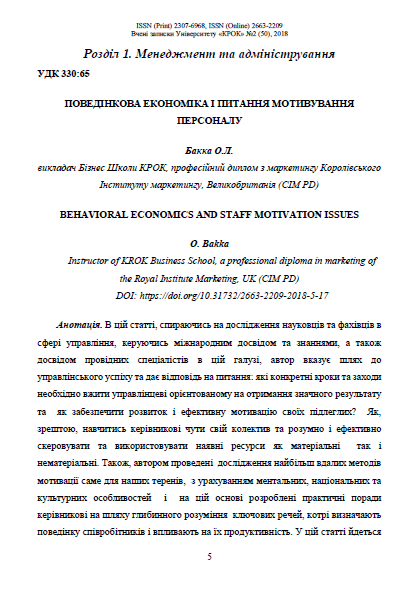Behavioral economics and staff motivation issues
DOI:
https://doi.org/10.31732/2663-2209-2018-50-5-17Keywords:
behavioral economics, personnel management, financial and non-financial incentives, staff motivation, effective managementAbstract
In this article, based on the research of scientists and specialists in the field of management, guided by international experience and knowledge, as well as the experience of leading experts in this field, the author points the way to managerial success and answers the question: what specific steps and measures should be taken by an oriented manager to obtain a significant result and how to ensure the development and effective motivation of their subordinates? How, however, to learn the head to hear the collective and reasonably and effectively to direct and use available resources both material and non-material. Also, the author has conducted research on the most successful methods of motivation specifically for our open spaces, taking into account mental, national and cultural characteristics, and on this basis, practical advice has been developed for the manager on the path to a deep understanding of key things that determine the behavior of employees and affect their performance. This article describes what incentives and motives, in most cases, control the behavior of subordinates, how to reach an employee in order to encourage him to work as efficiently as possible and to be proactive in the workplace. What should be done to prevent the employee’s internal stress from growing like a snowball, but softening and minimizing through an external special action? Also, in this article there is an answer to the question: how in the harsh conditions of the present to increase the effectiveness of subordinate managers of enterprises and divisions in Ukraine? What trends are currently more in tune with the needs of Ukrainian workers in the world: global or European, and which of the factors affecting employees' willingness to work that are effective for Ukraine, those that are either in terms of financial rewards or non-financial incentives? And other important questions.
Downloads


